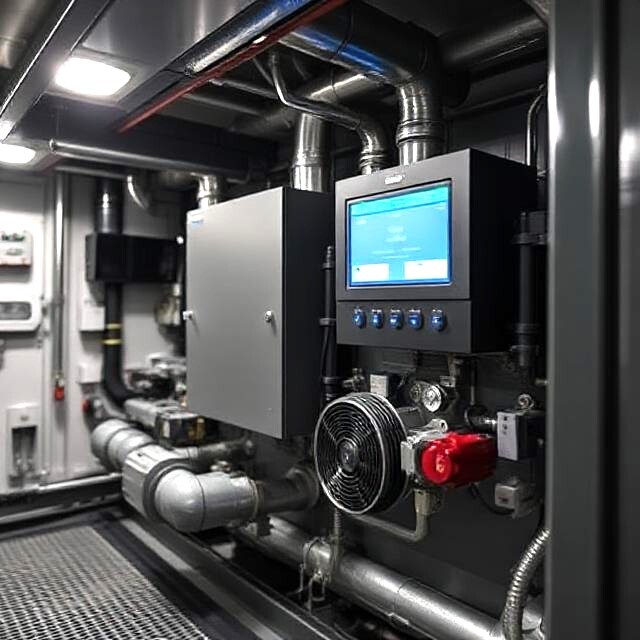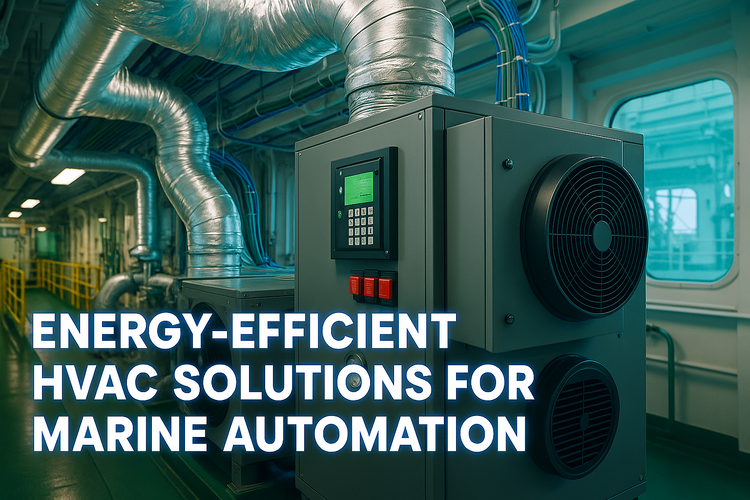In today’s marine industry, energy efficiency and automation are more than just bywords—they are essential for reliable and sustainable operations. Heating, Ventilation, and Air Conditioning (HVAC) systems play a crucial role in keeping ships safe, comfortable, and functional. But with rising fuel costs and the global push for sustainability, marine operators are now shifting their focus to energy-efficient HVAC solutions integrated with advanced automation technologies.
This blog explores how energy-efficient HVAC systems are changing the inclined in marine automation and why they are the smart choice for modern vessels.
Smart HVAC in Marine Automation

HVAC systems control the temperature, humidity, and air quality onboard marine vessels. These systems are vital for:
- Maintaining comfort for crew and passengers
- Protecting sensitive equipment from overheating
- Ensuring air circulation in engine rooms, control rooms, and cabins
In a marine environment, HVAC systems must operate under harsh conditions—salt-laden air, vibration, moisture, and temperature fluctuations. That’s why integrating these systems with automated controls helps monitor performance in real-time, reduce human error, and optimize energy use.
Why Energy Efficiency Matters in Marine HVAC
Running HVAC systems consumes a large amount of energy onboard ships—often second only to propulsion systems. Traditional HVAC units can drain power, increase fuel consumption, and lead to unnecessary maintenance costs.
Energy-efficient HVAC systems provide the following benefits:
- Lower Fuel Consumption: Reduced power usage translates to less strain on diesel generators.
- Lower Emissions: Contributing to cleaner oceans by meeting IMO environmental standards.
- Operational Cost Savings: Lower energy bills and fewer breakdowns.
- Reliable Performance: Smart systems can adapt to changing temperatures and humidity automatically.
For a vessel operating long distances, even small improvements in efficiency can lead to significant savings over time.
Key Features of Energy-Efficient Marine HVAC Systems
To ensure maximum efficiency in marine environments, energy-efficient HVAC systems are designed with the following advanced features:
1. Variable Speed Drives (VSDs)
VSDs adjust the fan or compressor speed based on real-time cooling or heating demand. Instead of running at full speed all the time, the system only uses the energy it needs—saving power without affecting performance.
2. Energy Recovery Systems
Heat exchangers and energy recovery ventilators reuse waste heat from exhaust air to pre-condition incoming fresh air, reducing heating or cooling load.
3. Smart Thermostats and Sensors
Automated sensors detect temperature, humidity, and occupancy. These sensors send real-time data to control systems, allowing the HVAC to respond instantly and efficiently.
4. Efficient Compressors and Fans
Modern marine HVAC units are equipped with high-efficiency compressors and fans that consume less energy while maintaining performance.
5. Zoning Systems
Ships can be divided into zones as cabins, engine rooms, bridge, each with its own temperature setting, which avoids cooling unused areas.
Technologies Supporting Energy-Efficient Marine HVAC
Modern marine HVAC systems are powered by smart automation and energy-saving technologies. Let’s look at some that are commonly used:
1. Marine Automation Systems Integration
HVAC units are now integrated with ship-wide automation systems such as SCADA or PLC-based control systems. These enable centralized control and real-time monitoring.
2. IoT-Enabled HVAC Systems
Internet of Things (IoT) devices in HVAC systems allow remote access, predictive maintenance, and data analysis for energy trends.
3. Demand-Based Ventilation
This system increases or decreases ventilation based on actual occupancy or air quality needs—saving energy without compromising comfort.
4. Chiller Optimization Software
Marine chillers, a key part of HVAC systems, are now equipped with smart software that optimizes water flow and load sharing between compressors.
Applications of Energy-Efficient HVAC Systems in Marine Vessels
Energy-efficient HVAC systems are not limited to passenger ships. They are used in various marine applications, including:
- Commercial Vessels – container ships, tankers, cargo carriers
- Offshore Platforms – oil rigs and floating production systems
- Defense & Navy Ships – where energy savings support stealth and long endurance
- Cruise Ships & Yachts – high comfort with low noise and better environmental compliance
- Fishing Vessels – ensuring safe storage and crew comfort in harsh climates
Future Trends in Marine HVAC and Automation
As technology evolves, marine HVAC systems are becoming smarter, cleaner, and more connected. Here are the key trends shaping the future:
- AI and Machine Learning: Predictive energy use, automated optimization, and intelligent fault detection.
- Cloud-Based Monitoring: Remote diagnostics and energy reports accessible from anywhere.
- Eco-Friendly Refrigerants: New gases with lower global warming potential (GWP).
- Hybrid Energy Systems: Integration with solar, waste heat recovery, or battery systems.
Ships of the future will be fully automated and energy-optimized—starting with the HVAC.
Benefits of Energy-Efficient HVAC in Marine Automation

To review, here are the top benefits of using energy-efficient HVAC systems on automated marine vessels:
- Reduces Operating Costs – Cuts down on energy bills and fuel usage.
- Boosts Equipment Lifespan – Lower load on machinery results in fewer failures.
- Improves Crew Comfort – Consistent temperature and air quality enhance wellbeing.
- Supports Environmental Goals – Complies with marine emission regulations.
- Enables Smarter Ships – Works seamlessly with marine automation systems.
Why Choose Energy-Efficient HVAC for Your Marine Operations?
Choosing an energy-efficient HVAC system is no longer optional—it’s a smart decision for shipowners who care about performance, savings, and the environment. With increasing pressure to meet IMO standards, reduce fuel use, and ensure operational safety, these systems offer the perfect balance between comfort and control. By integrating automation and energy-saving features, you can future-proof your vessel and make your operations more reliable and cost-effective.
Energy-efficient HVAC solutions are transforming the marine automation landscape. From reducing power consumption to enabling smart control, these systems are becoming essential components of modern maritime operations.Whether you operate cargo vessels, offshore platforms, or passenger ships, upgrading to an automated, energy-efficient HVAC system can bring long-term value, safety, and sustainability.

